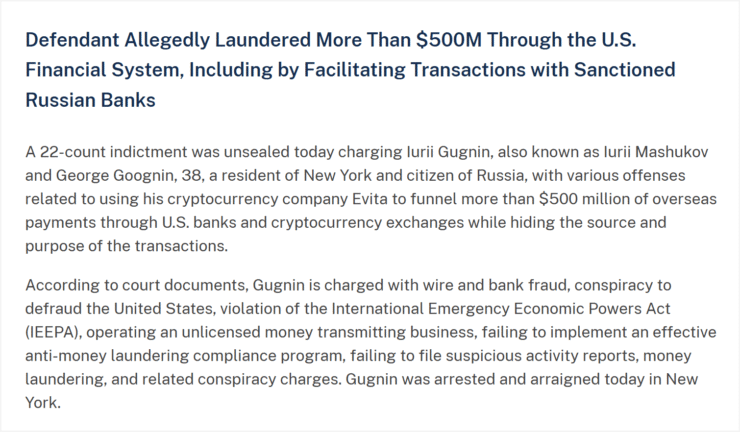U.S. authorities have indicted Iurii Gugnin, a Russian national and founder of Evita Investments and Evita Pay, for allegedly orchestrating a massive laundering scheme that funneled over half a billion dollars through the American financial system to benefit Russian entities under international sanctions.
Federal prosecutors say Gugnin’s operations—based in New York—functioned as a shadow financial network from mid-2023 through early 2025. According to the indictment, the companies acted as covert conduits for blacklisted institutions like Sberbank, VTB, and Tinkoff Bank, enabling them to bypass U.S. sanctions and acquire prohibited American technologies, including components tied to the nuclear sector.

What initially appeared to be standard crypto payment platforms allegedly concealed a more dangerous objective: helping foreign adversaries gain access to the global banking system and sensitive tech markets. The Justice Department emphasized the national security threat posed by the nature of the materials transacted.
Gugnin now faces a 22-count indictment, with each bank fraud charge carrying a potential 30-year prison sentence. Additional charges related to sanctions evasion and money laundering could add decades more. His arrest marks one of the most aggressive U.S. actions yet against crypto-enabled sanctions evasion.
Gugnin Accused of Masking Russian Ties
Court filings reveal a deeper layer to the case, outlining how Gugnin allegedly built an intricate laundering system to help Russian elites and state-linked entities dodge Western restrictions. Prosecutors claim that while publicly denying any ties to Russia, Gugnin maintained personal accounts with sanctioned banks like Alfa-Bank and Sberbank—even while living in the U.S.
The indictment details how foreign clients sent Gugnin cryptocurrency, which he routed through a complex web of digital wallets and U.S. bank accounts. The crypto was then converted to dollars and passed through Manhattan-based financial institutions, often to purchase export-restricted American technology. One named recipient: Rosatom, Russia’s state nuclear corporation.
In one instance of alleged deception, Gugnin is said to have erased or masked Russian customer details from invoices to avoid detection by U.S. banks.
Adding to the weight of the charges, prosecutors say they uncovered search queries on Gugnin’s devices such as “how to know if there is an investigation against you” and “penalties for sanctions violations EU luxury goods”—suggesting premeditated wrongdoing.
U.S. Targets Russia’s Crypto Workarounds
Gugnin’s arrest is part of a broader crackdown by U.S. authorities targeting Russian-linked crypto operations that help circumvent sanctions. Since the onset of the Ukraine invasion in 2022, Russia has faced tightening financial restrictions and turned to crypto as a key workaround.
Chengyi Ong, Head of APAC Policy at Chainalysis, noted that crypto has increasingly become a strategic tool for evasion. “Since the Ukraine invasion, crypto has served as a pressure-release valve for sanctioned entities unable to operate through banks,” she said.
According to Chainalysis, jurisdictions under sanctions received nearly $15.8 billion in crypto in 2024, representing nearly 40% of all illicit crypto flows globally. Russia’s 2023 move to legalize cryptocurrency for cross-border transactions further signaled its shift toward decentralized finance.
While shell companies and off-chain tactics remain in use, Ong emphasized that blockchain’s transparency is aiding enforcement. “Better compliance systems and data-driven tracking have already led to a significant drop in exchange activity with flagged entities,” she added.
Recent operations underscore that progress. In “Operation Final Exchange,” German officials shut down dozens of Russian-language no-KYC exchanges. Russia-based Cryptex, which processed nearly $6 billion since 2018, was also dismantled. These efforts reflect growing international coordination to prevent crypto from becoming a haven for sanctioned actors.
Quick Facts
- Iurii Gugnin allegedly laundered $500M+ for blacklisted entities
- Companies linked to sanctioned Russian banks and Rosatom
- Gugnin now faces 22 charges, each carrying up to 30 years
- U.S. crackdown targets crypto-enabled sanctions evasion
- Chainalysis says 40% of illicit 2024 crypto flows tied to sanctions





